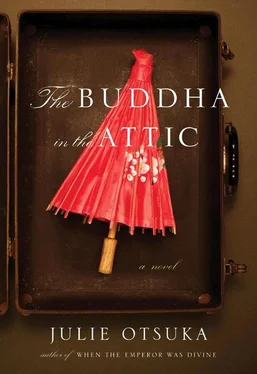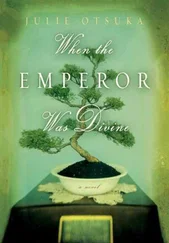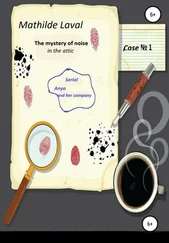HOME WAS A COT in one of their bunkhouses at the Fair Ranch in Yolo. Home was a long tent beneath a leafy plum tree at Kettleman’s. Home was a wooden shanty in Camp No. 7 on the Barnhart Tract out in Lodi. Nothing but rows of onions as far as the eye can see . Home was a bed of straw in John Lyman’s barn alongside his prize horses and cows. Home was a corner of the washhouse at Stockton’s Cannery Ranch. Home was a bunk in a rusty boxcar in Lompoc. Home was an old chicken coop in Willows that the Chinese had lived in before us. Home was a flea-ridden mattress in a corner of a packing shed in Dixon. Home was a bed of hay atop three apple crates beneath an apple tree in Fred Stadelman’s apple orchard. Home was a spot on the floor of an abandoned schoolhouse in Marysville. Home was a patch of earth in a pear orchard in Auburn not far from the banks of the American River, where we lay awake every evening staring up at the American stars, which looked no different from ours: there, up above us, was the Cowherd Star, the Weaver Maiden Star, the Wood Star, the Water Star. “Same latitude,” our husbands explained. Home was wherever the crops were ripe and ready for picking. Home was wherever our husbands were. Home was by the side of a man who had been shoveling up weeds for the boss for years.
IN THE BEGINNING we wondered about them constantly. Why did they mount their horses from the left side and not the right? How were they able to tell each other apart? Why were they always shouting? Did they really hang dishes on their walls and not pictures? And have locks on all their doors? And wear their shoes inside the house? What did they talk about late at night as they were falling asleep? What did they dream of? To whom did they pray? How many gods did they have? Was it true that they really saw a man in the moon and not a rabbit? And ate cooked beef at funerals? And drank the milk of cows? And that smell? What was it? “Butter stink,” our husbands explained.
STAY AWAY FROM THEM, we were warned. Approach them with caution, if you must. Do not always believe what they tell you, but learn to watch them closely: their hands, their eyes, the corners of their mouths, sudden changes in the color of their skin. You will soon be able to read them. Make sure, however, that you don’t stare. With time you will grow accustomed to their largeness. Expect the worst, but do not be surprised by moments of kindness. There is goodness all around. Remember to make them feel comfortable. Be humble. Be polite. Appear eager to please. Say “Yes, sir,” or “No, sir,” and do as you’re told. Better yet, say nothing at all. You now belong to the invisible world.
THEIR PLOWS WEIGHED more than we did, and were difficult to use, and their horses were twice the size of our horses back home in Japan. We could not harness them without climbing up onto orange crates, or standing on stools, and the first time we shouted out to them to move they just stood there snorting and pawing at the ground. Were they deaf? Were they dumb? Or were they just being stubborn? “These are American horses,” our husbands explained. “They don’t understand Japanese.” And so we learned our first words of horse English. “Giddyap” was what you said to make the horse go forward, and “Back” was what you said to make it back up. “Easy” was what you said to make it slow down, and “Whoa” was what you said to make it stop. And after fifty years in America these would be the only words of English some of us could still remember by heart.
WE HAD LEARNED a few phrases of their language on the boat from our guidebooks—“Hello,” “Beg pardon,” “Please pay me my wages”—and could recite their ABCs, but in America this knowledge was useless. We could not read their magazines or newspapers. We stared at their signs in despair. All I remember is it began with the letter e. And whenever the boss spoke to us we could hear his words perfectly clearly but they made no sense to our ears. And on the rare occasions when we had to make ourselves known to them— Mr. Smeesh? —they stared at us in bewilderment, then shrugged their shoulders and walked away.
DON’T LET THEM discourage you. Be patient. Stay calm. But for now , our husbands told us, please leave the talking to me . For they already spoke the English language. They understood the American ways. And whenever we needed new underwear they swallowed their pride and walked through the hot blazing fields into town and in perfect but heavily accented English they asked the shopkeeper for a new pair. “Not for me,” they explained. And when we arrived at a new ranch and the boss took one look at us and said, “She’s too frail,” it was our husbands who convinced him otherwise. “In the fields my wife is as good as a man,” they would say, and in no time at all this was true. And when we fell ill with malaria and could not lift our heads off the floor it was our husbands who told the boss what was wrong: “First she’s hot, then she’s cold, then she’s hot again.” And when the boss himself offered to drive into town that very same afternoon to buy us the medicine that would cure us—“Don’t you worry about the money,” he said—it was our husbands who thanked him profusely. And even though that medicine turned our urine dark purple for days, we soon began to feel well.
SOME OF US worked quickly to impress them. Some of us worked quickly just to show them that we could pick plums and top beets and sack onions and crate berries just as quickly if not more quickly than the men. Some of us worked quickly because we had spent our entire childhoods bent over barefoot in the rice paddies and already knew what to do. Some of us worked quickly because our husbands had warned us that if we did not they would send us home on the very next boat. I asked for a wife who was able and strong . Some of us came from the city, and worked slowly, because we had never before held a hoe. “Easiest job in America,” we were told. Some of us had been sickly and weak all our lives but after one week in the lemon groves of Riverside we felt stronger than oxen. One of us collapsed before she had even finished weeding her first row. Some of us wept while we worked. Some of us cursed while we worked. All of us ached while we worked—our hands blistered and bled, our knees burned, our backs would never recover. One of us was distracted by the handsome Hindu man cutting asparagus in the next furrow over while she worked and all she could think of was how much she wanted to unravel his white turban from his enormous brown head. I dream about Gupta-san nightly . Some of us chanted Buddhist sutras while we worked and the hours flew by like minutes. One of us—Akiko, who had gone to a mission school in Tokyo and already knew English and read aloud to her husband every night from the Bible—sang “Arise, My Soul, Arise” while she worked. Many more of us sang the same harvest songs we had sung in our youth and tried to imagine we were back home in Japan. Because if our husbands had told us the truth in their letters—they were not silk traders, they were fruit pickers, they did not live in large, many-roomed houses, they lived in tents and in barns and out of doors, in the fields, beneath the sun and the stars—we never would have come to America to do the work that no self-respecting American would do.
THEY ADMIRED US for our strong backs and nimble hands. Our stamina. Our discipline. Our docile dispositions. Our unusual ability to tolerate the heat, which on summer days in the melon fields of Brawley could reach 120 degrees. They said that our short stature made us ideally suited for work that required stooping low to the ground. Wherever they put us they were pleased. We had all the virtues of the Chinese—we were hardworking, we were patient, we were unfailingly polite—but none of their vices—we didn’t gamble or smoke opium, we didn’t brawl, we never spat. We were faster than the Filipinos and less arrogant than the Hindus. We were more disciplined than the Koreans. We were soberer than the Mexicans. We were cheaper to feed than the Okies and Arkies, both the light and the dark. A Japanese can live on a teaspoonful of rice a day . We were the best breed of worker they had ever hired in their lives. These folks just drift, we don’ t have to look after them at all .
Читать дальше












